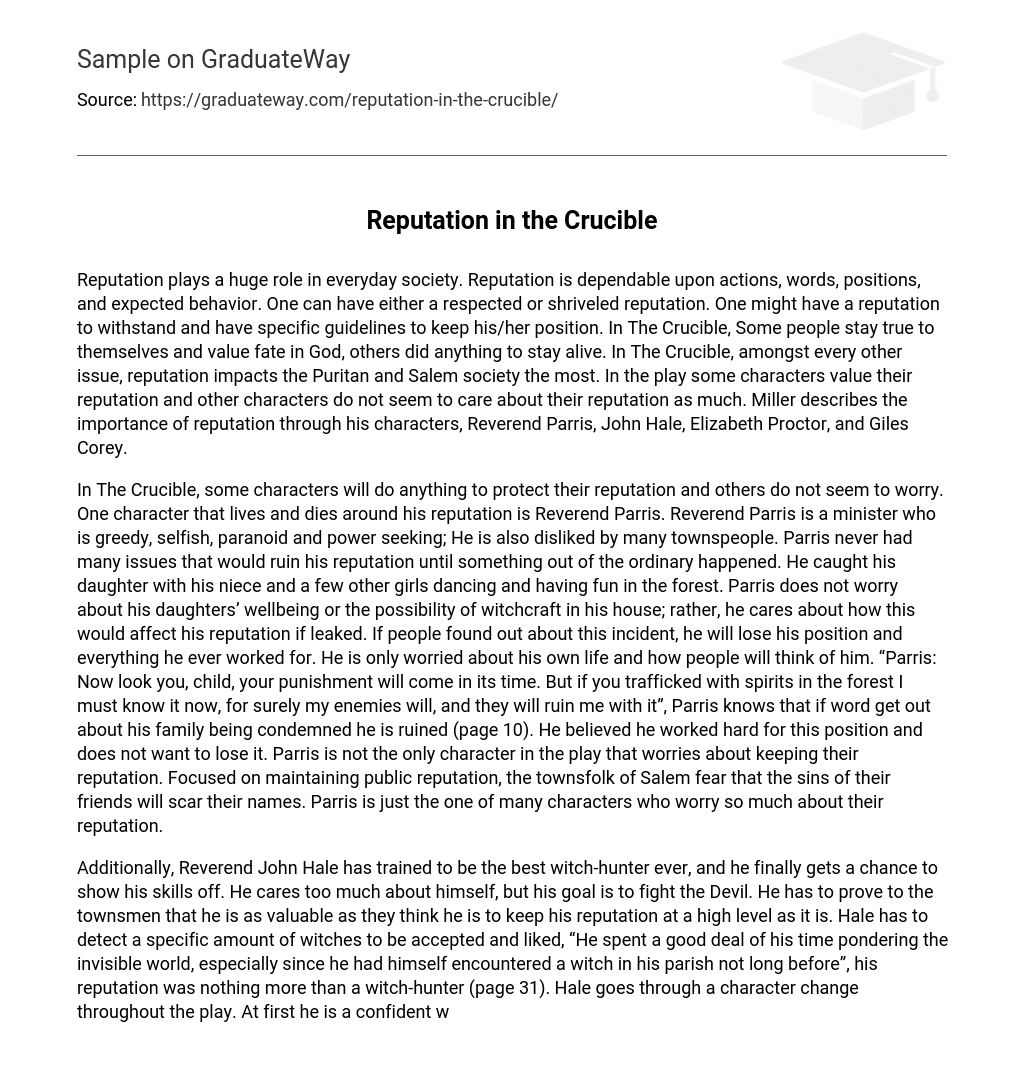Reputation plays a significant role in society every day, depending on actions, words, positions, and expected behavior. It can either be respected or diminished. Some individuals have reputations to uphold and specific guidelines to maintain their positions. In The Crucible, characters demonstrate their true selves and rely on their faith in God while others do whatever it takes to survive. Reputation greatly impacts the Puritan and Salem society in the play, alongside various other issues. While some characters value their reputation, others seem indifferent towards it. Through Reverend Parris, John Hale, Elizabeth Proctor, and Giles Corey, Miller effectively conveys the importance of reputation.
In The Crucible, Reverend Parris is a character who values his reputation greatly, while others seem unaffected. Known for his greed, selfishness, paranoia, and desire for power, Reverend Parris is disliked by many in the town. However, he had not faced any significant incidents that could damage his reputation until an unusual event occurred. When he discovered his daughter, niece, and some other girls dancing and frolicking in the forest, Parris showed little concern for their well-being or the possibility of witchcraft in his household. His main worry was how this scandal would impact his reputation if it were revealed. Losing everything he had worked for was his greatest fear if the truth about the incident became public knowledge. Parris’s self-preservation and concern about others’ perception of him were evident when he stated that if word spread about his family’s involvement in witchcraft, it would ruin him (page 10). Having dedicated himself to obtaining this position through hard work, Parris was determined not to let go of it.However, it is not only Parris in the play who is concerned with maintaining their reputation. The people of Salem, driven by the fear that their friends’ sins will tarnish their own names, are also dedicated to safeguarding their public image. In fact, Parris is just one of many characters who share this extreme concern about their reputation.
Reverend John Hale, an acclaimed witch-hunter, has dedicated his training to becoming the top expert in this field. His main objective is to fight against evil in the form of witches. Driven by his self-absorption, he is determined to prove his worth to the townspeople and uphold his esteemed reputation. To gain acceptance and admiration, Hale strives to identify a specific number of witches. This drive originates from a previous encounter with a witch in his own parish, which solidified his identity as a witch-hunter (page 31). However, throughout the play’s progression, Hale goes through a transformation. Initially confident as he identifies those afflicted by witchcraft, he eventually shifts his focus towards helping those wrongly accused rather than preserving his own reputation. Observing the devastating consequences of false accusations in Salem leads him to diminish his concern for personal image. Reverend Hale experiences internal conflict due to conflicting beliefs and faith in individuals.
Elizabeth Proctor, married to John Proctor, is depicted as a distant and reserved victim whose social status in the community hinges solely on her husband’s reputation. Although John enjoys popularity, integrity, and admiration from the people of Salem, they remain oblivious to his unfaithful behavior. Elizabeth harbors deep concerns about safeguarding her spouse’s standing and is willing to go to great lengths in order to achieve this objective. Despite uncovering John’s romantic involvement with Abigail, she opts to keep it concealed out of fear of ruining his life. The foremost priority for Elizabeth is ensuring her husband’s happiness and well-being. Even when questioned during court proceedings, she fabricates falsehoods in an effort to shield him from harm by falsely denying his infidelity. Regrettably, this act of deception only serves to compound John’s troubles. Overwhelmed by guilt for not displaying sufficient love and devotion towards him, Elizabeth places greater importance on preserving her husband’s reputation rather than prioritizing her own.
The play also portrays the absence of reputation as a significant factor. Some characters, unconcerned about their standing or reputation, exemplify this. Giles Corey, an elderly man who recently converted to Christianity, plays a prominent role in this lack of reputation. Despite his extensive knowledge of the law, Giles is portrayed as not very intelligent, stating, “I am thirty-three times in court in my life. I have never been taken advantage of; I know my rights, sir, and I will assert them” (page 88). Giles’s strong character is evident when he refuses to confess or deny the accusations of witchcraft placed upon him. This action ensures that his sons can legally inherit his property. Despite enduring severe torture, including the weighty stones placed on his chest, Giles bravely utters the words “More weight” (page 121). Rather than admitting to false claims or pleasing the court, Giles desires to die with dignity and protect his family.
Arthur Miller explores the significance of reputation through his main characters in the play. While some characters highly value their reputation, others seem indifferent to it. Reverend Parris prioritizes his reputation and is concerned about how he is perceived by others. Reverend John Hale is solely focused on exposing witches to protect his own reputation within the Salem community. Elizabeth Proctor is dedicated to preserving her husband John Proctor’s reputation, and she is willing to go to great lengths to achieve this. In contrast, Giles Corey prioritizes his family’s well-being. The Puritan society is in chaos, and the struggle for reputation within society has contributed to its corruption.





